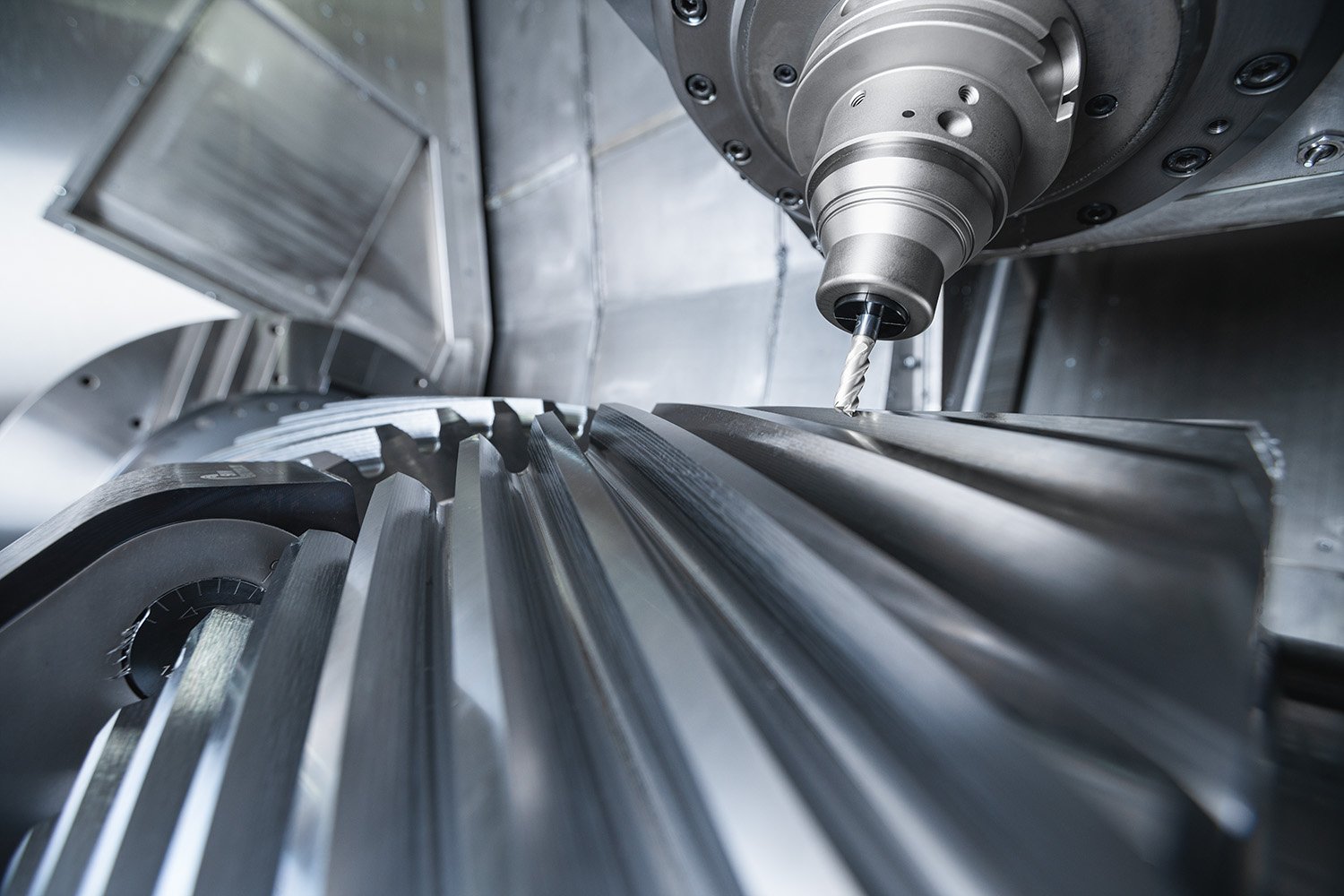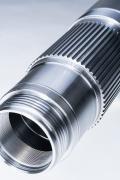The turning-boring-milling unit ranks among the most important and complex components in every MILLTURN. Extremely precise procedures, continuous improvements and, above all, strongly unified teamwork are needed to be able to construct a product of this kind. Many individual actions, starting with machining the body and routing of the cables, all the way up to the test run of the turning-boring-milling unit (TBMU), are perfectly synchronized and subject to strict tolerance criteria. Hans Peter Wachs can best be described as the senior physician of this technical surgery and „operates“ on the most complex turning-boring-milling units every day with his 17-person team. In this edition of COMPLETE, Mr Wachs offers us some insights into his work and reveals what a typical day looks like in the operating room of the Precision Assembly.
Mr Wachs, please tell us a bit about yourself and your career.
I began my mechanical engineering apprenticeship back in 1980, when the company was still VOEST-ALPINE Linz, which I successfully completed in 1984. Having finished my apprenticeship, I began to work as a mechanical engineer in the Machine Tool Assembly department of VOEST-ALPINE, later VOEST-ALPINE STEINEL. Preassembly had not yet been established at this time, which meant I had the opportunity to familiarise myself with various components. I then attended the vocational school for foremen from 1985 to 1987. It was during this time that I also started my first overseas deployments, including a project in China. From 1988 onwards, I was then assigned to the Precision Assembly department. I started work on the construction of the 15 kW turning-boring-milling unit here and, among other things, was also involved in the installation of the prototype of the 9 kW turning-boring-milling unit. From 1994 onwards, I then transitioned seamlessly to WFL Millturn Technologies GmbH & Co. KG, where I was also assigned to the Precision Assembly department. I continued working as a mechanical engineer in this department until 2018, handling all machine types from the 9 kW to the 80 kW turning-boring-milling unit (M200 MILLTURN). In 2018, I then assumed responsibility for the Precision Assembly 01 and 02 departments, as well as the Special Tools department. The new duties I have taken on now involve managing and coordinating these departments.
Which position in the course of your career has had the greatest influence on you professionally?
My overseas deployments have certainly had a big influence. Since neither EDP, mobile phones nor the Internet were around in the 1980s, it was pretty challenging as a young employee to find solutions again and again without the help of Dr. Google. However, this was really beneficial and helped me gain valuable experience. Constructing a large number of prototypes also helped me build on and extend my technical knowledge.
What part does your specialist knowledge play in your current position?
Since I am very familiar with the structure of the machines and their functions, it is easy for me to answer various questions and pass on my knowledge to the next generation. I have been able to build up my knowledge over many years of working in Assembly. This experience helps me reach certain decisions both quickly and easily in many cases.
How do you organise your day-to-day duties and what is the most important in this regard?
I turn on my PC early in the morning and check my e-mails. Since I have set up my workplace in the Precision Assembly 01 department, this is where I generally get started. I then also pay a visit to my two other departments, Precision Assembly 02 (PM 02) and Special Tools, where I also determine what needs to be done. Once I have done this, I distribute the tasks, work through orders and process/resolve issues.
What are your favourite tasks and which do you enjoy less?
I love getting to grips with new challenges. Working on prototypes or problems associated with mechanical systems are tasks that I really enjoy. I am less keen on so-called office work, although I understand that this is also an important part of my duties.
What does teamwork mean for you?
For me, teamwork means being able to ask questions at any time and then receiving both a useful answer and support. This not only strengthens team spirit, but also allows existing knowledge to be passed on to younger colleagues. This works really well in my departments, not least because my staff members are so committed.
Where do you see your own personal strengths and weaknesses?
It is always difficult to assess and detect your own strengths, as these are part of your personality. My strengths include analysing mechanical processes, as well as my solution-oriented approach. In terms of weaknesses, I would describe my pronounced sense of perfectionism or my very high expectations in terms of accuracy when performing complex and specific tasks as potential weak areas.
How do you see yourself in terms of your character and skills? How would you describe yourself?
I can best describe my character as calm, level-headed and humorous - aspects that are often beneficial in working life. I am able to achieve a lot with my patient, yet determined approach, particularly when solutions need to be found in stressful situations. To avoid mistakes, I place great emphasis on sustainable and foresighted approaches to work. My accuracy, which I already mentioned, really helps me in difficult situations where the objective is sometimes also to localise a fault or find solutions.
What are you like when working with deadline pressure?
I have now been working in this sector for almost 40 years, during which time I have experienced a lot of highly stressful situations with very pronounced deadline pressure. Based on my own experience, I can say that it is also important in situations like this to remain focused yet maintain a sense of calm to ensure that important decisions are not reached too hastily. Flexibility is also an important characteristic for meeting deadlines here. I should also say that I have an excellent team around me. Whether in PM 01, PM 02 or Special Tools, I can really rely on my staff, even when working under the kind of massive time pressure we often encounter.
What was your most difficult problem to date and how did you resolve it?
Something that really sticks in my memory from my early years was the first time I flew to China, where my colleagues were already waiting for me on site. I was standing at the airport in Beijing with 120 kg of excess baggage (spare parts) in four suitcases and was unable to find a baggage cart anywhere. The ultimate solution to this issue was certainly not very gentleman-like, as I was forced to pinch the cart of a Chinese lady while she was not looking. When she then came up to me and asked what I was doing, I simply made out as though I could not understand what she was saying. After a few minutes, however, she understood my problem and was friendly enough to let
me keep her cart, so that I could transport all of my bags and suitcases. I should really express my sincere thanks once again at this point.
What are your professional and personal goals? What would you like to have achieved in the next five or ten years? What position can you see yourself assuming?
More than a year ago, I was given the opportunity to take over the business of my colleague Brandl Wilhelm. I think this will keep me busy over the next 5-10 years. I am looking forward to the professional challenges and making every effort to develop and grow together with the technology. However, the most important thing for me is to manage my department effectively, while also reinforcing and building on the reputation enjoyed by Precision Assembly through implementation of potential improvements. Another goal that I have in my personal life is to watch my grandchildren grow up and spend as much time as possible with them.
How do you motivate yourself if you occasionally feel down?
The truth is that I generally do not have enough time to feel down. After all, things can very quickly change for the better.
What do you do to „recharge your batteries“ at the end of a stressful workday?
The best way for me to recharge my batteries is to spend time with my family. If like me, however, you live in the country, taking a twenty minute walk in the natural surroundings often does the trick. I can then relax by working in our garden. Other things that help me balance the stress of day-to-day work include taking part in plays at the Katsdorf amateur dramatics society or riding my motorcycle.
As a child, what did you want to be when you grew up?
I actually never had a specific career in mind as a child. Yet I have always been fascinated with large construction and agricultural machinery. This interest was also one of the main reasons behind my decision to apply for a technical apprenticeship.
What does the future hold? In your opinion, what would be ideal for WFL?
One thing obviously worth striving for in the future is to maintain and also expand on the global leadership we enjoy in the field of complete machining centres. This is backed up by a company that has been putting in great effort for many years and boasts excellent employees that work towards this objective every single day.



 Austria
Austria 